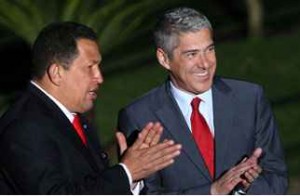
Former Portuguese Prime Minister José Sócrates found himself in a diplomatic quandary when Washington started pressuring him to take a tougher line on Hugo Chávez when the Venezuelan leader visited Lisbon.
A series of US embassy cables from 2006 released recently by Wikileaks show how the US government had pushed the Sócrates government on numerous occasions to be more vocal over Chávez’s human rights record. But US diplomats in Lisbon expressed their frustration over Portugal’s hesitancy to take a lead in diplomatic initiatives against the Chávez government because the Sócrates government feared repercussions against the large Portuguese community in Venezuela.
Sócrates saw Chávez’s visit in October 2006 “as a necessary evil rather than a welcome enhancement of relations,” according to US Ambassador Alfred Hoffman.
In one confidential missive, dated June 23, 2006, Foreign Minister Luis Amado told the US Embassy that Portugal would treat Venezuela “very carefully unless provoked.”
The following July, after Chávez made a refuelling stopover at Lisbon airport, Hoffman met with Amado to get “a readout” of Sócrates’ brief meeting with the Venezuelan leader. Chávez was returning home after a controversial tour to Belarus, Iran and Russia, where he signed a series of arms deal.
According to Amado, Sócrates had learned just days before that Chávez would be in Lisbon and wanted to meet with him. The Portuguese prime minister, who felt obligated to meet with him, asked Amado to give the US Embassy “a heads-up” because “he expected the meeting would be viewed with suspicion in Washington.” But Amado told the ambassador that he “completely forgot” to alert him.
The foreign minister told US diplomats that Sócrates “delivered some tough messages… on the importance of regional stability and political dialogue.” The prime minister also offered to help mediate any problems Chávez had with Washington but the Venezuelan president declined, saying that other countries had tried before but the differences with the United States were “not so easy to resolve,” reads the July 28, 2006 cable.
Amado told the US ambassador that “we definitely need to deal with this personality very carefully.” The main concern for Lisbon was the estimated 600,000 Portuguese nationals who live in Venezuela. Thousands of Spaniards, Portuguese and Italians emigrated to Venezuela under an offer made by former dictator Marcos Pérez Jiménez (1952-1958) who enticed the post-war Europeans with work in public projects.
Amado told the US ambassador that he believed Chávez was “a smart guy, populist, and emotional, but I don’t see him as irrational.” Nevertheless the Portuguese foreign minister said that “someone ‘from our side’ has to talk to him from time to time; he needs to hear messages from those who think like we think.” Otherwise, Amado cautioned, he would develop “a skewed perception of reality if he only has contact with people like [Belarus President Alexander] Lukashenko and [Iran’s Mahmoud] Ahmadinejad.”
Chávez’s “threat to regional stability”
“We have had many discussions with senior Portuguese officials about Venezuela, and it is clear they share our concerns about his domestic policies and the threat he poses to regional stability,” Ambassador Hoffman told his superiors in Washington.
Nevertheless, Portugal, according to the ambassador, was “very quietly” telling its former African colonies to support Guatemala, instead of Venezuela in the elections for a UN Security Council seat “but it is very nervous about the potential impact of that decision on its citizens in Venezuela.”
In October, Chávez made an official visit to Portugal, which again was met with “uneasiness” by the Sócrates government. Foreign Ministry’s Latin American Affairs Director Helena Coutinho told the US Embassy that Chávez’s visit could be “a tough one” but again it was allowing him to come in the interest of protecting “the well-being” of Portuguese citizens in Venezuela.
Chávez had been pressuring for a meeting since 2005 but then-President Jorge Sampaio denied the requests “due to Portugal’s annoyance over the house arrest in Caracas of a Portuguese pilot accused of drug trafficking,” the embassy wrote in August 8, 2006, quoting Coutinho. Sampaio pulled Chávez aside at an Ibero-American summit and pressed him to release the pilot. Relations improved again when the pilot was finally released.
Leave a Reply
You must be logged in to post a comment.